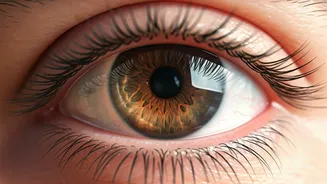The Rubbing Danger
Rubbing your eyes frequently might seem harmless, yet it poses significant risks. This action can lead to diverse eye problems, including infections. Rubbing introduces
potential for introducing bacteria and other pathogens, heightening the risk of contracting eye infections. Moreover, this seemingly innocent habit can cause damage to the cornea, the clear front surface of the eye. The delicate structures of the eye are easily compromised by the physical stress of rubbing, potentially leading to scratches or other forms of injury. Regularly rubbing your eyes can also exacerbate existing conditions or trigger new ones, making the habit a potential threat to vision health. Understanding the detrimental impacts is critical for preserving eye health and preventing avoidable complications.
Vision Troubles Arise
Frequent eye rubbing can manifest various vision-related complications. Damage to the cornea, for instance, can lead to blurred vision, light sensitivity, and even pain. Over time, consistent rubbing might contribute to the worsening of conditions such as glaucoma, a condition that damages the optic nerve and can lead to vision loss. Furthermore, the act of rubbing can induce or worsen symptoms of dry eye, leading to discomfort and visual disturbance. These effects serve as reminders of how the simple act of rubbing can have profound effects on eye health, urging individuals to evaluate and modify their habits to protect their precious eyesight. Prompt attention to vision-related concerns can prevent progressive deterioration and potentially protect long-term eye health.
Skin Issues Unveiled
The detrimental effects of rubbing extend beyond eye health and have implications for the skin surrounding the eyes. Dark circles around the eyes, often attributed to factors like fatigue or genetics, can be worsened by frequent rubbing. The delicate skin in this area is susceptible to damage, causing blood vessels to break, contributing to the appearance of dark circles. Premature wrinkles and loose skin may also result. The constant friction caused by rubbing speeds up the skin aging process, leading to loss of elasticity and the formation of fine lines and wrinkles. Paying attention to these signs and adjusting habits can help maintain healthy, youthful-looking skin. Recognizing the interplay between the habits and skin appearance encourages a holistic approach to care, encouraging a healthier appearance.
Irritation Relief Strategies
Avoiding eye rubbing can be challenging, but there are methods for relieving irritation. A common cause of irritation can be dry eyes; utilizing lubricating eye drops can provide immediate relief. These artificial tears help moisturize the eyes, reducing the urge to rub. When dealing with allergies, using prescribed or over-the-counter antihistamines can combat itching and other allergy symptoms, minimizing the need to rub. Addressing underlying conditions that contribute to irritation is also crucial. This may involve seeking professional advice for conditions like dry eyes or allergies, and adhering to prescribed treatments. Additionally, adopting conscious habits such as maintaining proper lighting and avoiding prolonged screen time can provide long-term eye health. By practicing these techniques, individuals can improve their comfort and protect their eyes from harm.
Preventative Measures
Taking preventative measures is key to shielding your eyes. One essential practice is to avoid touching your eyes unless absolutely necessary and to wash hands. This protects against the introduction of bacteria and pathogens that can lead to infections. In situations where eye irritation is prevalent, consider investigating the root cause. This could be due to environmental factors such as pollen, dust, or air pollution, so limiting exposure to these elements can reduce irritation. Making smart lifestyle choices can reduce the desire to rub eyes. Adequate hydration, sufficient sleep, and a balanced diet support overall health, including eye health. Prioritizing these activities fosters well-being and lessens the probability of irritation and eye-rubbing behavior, encouraging proactive and long-term eye health.




















